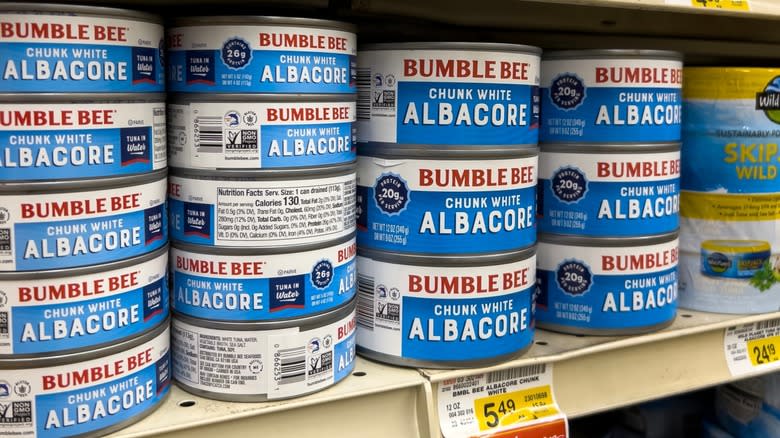What's The Difference Between Pouch And Canned Tuna?

High in protein, delicious in various dishes, and exceptionally easy to store, canned tuna is a blessing for the pantry. However, when purchasing this underrated wonder, you might feel lost in the abyss of varieties available in the canned aisle. While you may already be familiar with the differences between light and white canned tuna, you could be pondering whether there are any real disparities between pouch and canned tuna. The answer is yes, and likely more than you realize.
One of the most apparent differences is how the can and pouch structures affect the pieces of tuna. Tuna in a can is likely in bigger pieces (unless you opt for chunky tuna pouches) because the can protects the meat. Pouches do not provide the same support, so the tuna pieces inside will likely be smaller. This may impact what recipes you intend to use the tuna in; smaller, broken pieces would be great in a sauce or stew, while solid chunks would work best in tuna tacos or salad.
If you're short on time, consider how tuna pouches can be torn open, while canned tuna may require a can opener. Depending on your preferences, the differences highlighted between pouches and canned tuna could change which you opt for.
Read more: 11 Mistakes You Didn't Realize You Were Making With Tuna
It's What's Inside That Counts

When preserving any vegetable, fruit, meat, or fish, one of your greatest concerns may be how this process impacts nutrition. Different tuna brands, whether pouched or canned, will provide varying nutrition. Some will be lower in sodium, while others will be higher in fats due to being packaged in oil. However, usually, a pouch of tuna contains more tuna meat than canned. This is due to the additional weight of water in the canned variety. Although there are differing nutritional values of tuna (both pouched and canned), feeling like you get more meat for your buck is an advantage.
Alongside the minor differences in nutrition, pouches and canned tuna differ in weight and convenience. Cans are heavier than pouches, and this may be enough of a reason to select the latter. Yet, pouch tuna does not require draining, so if you're on the go, camping, or need a quick snack, it can be eaten immediately. At the same time, canned tuna must be entirely sealed in water and drained after.
However, while draining canned tuna may feel like a chore, the additional moisture inside the can reduces the amount of sauce or condiments you'll need to add to moisten the tuna meat. Pouch tuna is not bone dry, but it could require more ingredients to bring it to life in the same manner as canned. Consequently, this will affect the nutrition of the entire dish.
To Pouch Or Can?

The taste of pouch and canned tuna varies, and it could come down to personal preference — ultimately, you decide which tastes best for you. What may impact your choice is price. Pouch tuna tends to be more expensive than canned. However, consider that canned tuna contains added water and, overall, less meat than a pouch of tuna. Price is seemingly relative when you consider this.
If you're interested in the environmental impacts of canned versus pouch tuna products, you might be curious which is more sustainable. It's a tough one, as tuna pouches are plastic and cannot usually be recycled. Consequently, they create more waste, while cans can almost always be recycled. However, the energy and raw materials needed to construct cans opens another side of the debate, though you can make an educated choice by searching out cans with official eco-labels.
Will tuna pouches become the new pantry staple? Or shall canned continue to prevail? Both have their advantages and weaknesses; the decision ultimately lies with you.
Read the original article on Daily Meal.

